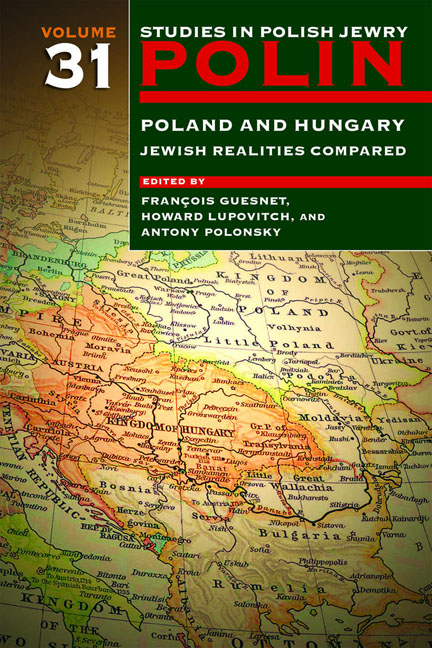Book contents
- Frontmatter
- Dedication
- Editors and Advisers
- Preface
- Polin
- Polin: Studies in Polish Jewry
- Contents
- Note on Place Names
- Note on Transliteration
- Part I POLAND AND HUNGARY: JEWISH REALITIES COMPARED
- JEWISH ACCULTURATION AND INTEGRATION
- JEWISH RELIGIOUS LIFE
- JEWS IN POPULAR CULTURE
- THE INTERWAR YEARS
- THE HOLOCAUST AND ITS AFTERMATH
- PERSONAL REFLECTIONS
- Part II NEW VIEWS
- Part III OBITUARIES
- Notes on the Contributors
- Index
Preface
- Frontmatter
- Dedication
- Editors and Advisers
- Preface
- Polin
- Polin: Studies in Polish Jewry
- Contents
- Note on Place Names
- Note on Transliteration
- Part I POLAND AND HUNGARY: JEWISH REALITIES COMPARED
- JEWISH ACCULTURATION AND INTEGRATION
- JEWISH RELIGIOUS LIFE
- JEWS IN POPULAR CULTURE
- THE INTERWAR YEARS
- THE HOLOCAUST AND ITS AFTERMATH
- PERSONAL REFLECTIONS
- Part II NEW VIEWS
- Part III OBITUARIES
- Notes on the Contributors
- Index
Summary
THIS VOLUME OF Polin: Studies in Polish Jewry explores the parallels, connections, and differences between Polish and Hungarian Jewry. These two Jewish populations, the largest in Europe and arguably the most culturally vibrant at the beginning of the twentieth century, have rarely been studied comparatively. Historians of Hungarian Jewry, in particular, have tended to downplay these similarities, preferring instead to emphasize the central European character of Hungary and Hungarian Jewry.
The volume is divided into six sections. The first compares the processes of Jewish acculturation and integration, analysing the magnate–Jewish symbiosis and the complexity of integration in multi-ethnic environments in the two countries. The second analyses the similarities and differences in Jewish religious life, discussing the impact of Polish hasidism in Hungary and the nature of ‘progressive’ and Neolog Judaism. Jewish popular culture is the theme of the third section, with accounts of the Jewish involvement in Polish and Hungarian cabaret and film. The fourth section examines the deterioration of the situation in both countries in the interwar years, while the fifth section compares the implementation of the Holocaust and the way it is remembered. The Hungarian focus concludes with a long interview with the doyen of historians of Hungary, Istvan Deak. We also include in this volume in the ‘New Views’ section an article on ‘Polish National Antisemitism’.
Polin is sponsored by the Institute of Polish–Jewish Studies, which is an associated institute of the Oxford Centre for Hebrew and Jewish Studies, and by the American Association for Polish--Jewish Studies, which is linked with the Department of Near Eastern and Judaic Studies, Brandeis University. As with earlier issues, this volume could not have appeared without the untiring assistance of many individuals. In particular, we should like to express our gratitude to Professor Ron Liebowitz, president of Brandeis University, to Mrs Irene Pipes, president of the American Association for Polish–Jewish Studies, and to Andrzej Szkuta, treasurer of the Institute for Polish–Jewish Studies. These three institutions all made substantial contributions to the cost of producing the volume.
- Type
- Chapter
- Information
- Polin: Studies in Polish Jewry Volume 31Poland and Hungary: Jewish Realities Compared, pp. vii - viiiPublisher: Liverpool University PressPrint publication year: 2018



